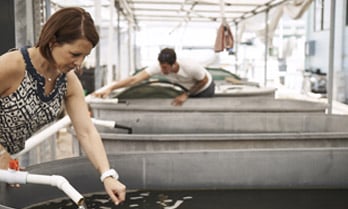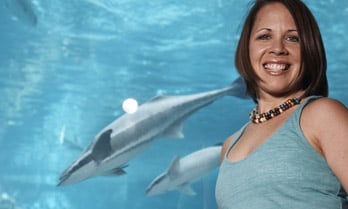Revisiting our 2016 Fellow - Dr Angela Crean
11 January 2018
In 2016, we awarded three Australian and one New Zealand For Women in Science Fellowships. One year on we were eager to catch up with these Fellows to ask how their research was progressing and how winning the Fellowship influenced their career.
2016 Australian Fellow - Angela Crean

Dr Angela Crean investigates an area within reproductive research often overlooked – male infertility. Infertility affects one in six Australian couples with 40% of these cases linked to the male and the quality of their sperm.
Angela believes that the quality of sperm can be adjusted by manipulating its environment – effectively we can boost sperm quality! Angela is a leader in this emerging field of research that uses evolutionary theory to develop novel and innovative treatments for modern-day epidemics such as infertility. The potential impact of Angela’s work is significant and could provide the opportunity to make infertility treatments less invasive
Boosting sperm! Can it be done? And if so, how?
Yes! Sperm quality is constantly changing in response to the environment, so males can boost their sperm through health and lifestyle interventions, much the same way that females can prepare their bodies for pregnancy. Additives can also be added to sperm-supporting media used in assisted reproduction. However, what we don’t know is whether boosting sperm has downstream consequences for the health of offspring, which is what I hope to work on next.
During your time as a FWIS Fellow you also became a mother, how are you finding juggling your career and family?
It is certainly a challenge, and I am still trying to get the balance right. I was very grateful for the FWIS Fellowship, as it gave me something to look forward to returning to work for – I am so excited to get my experiment up and running and to see where it takes me.
What was the great part of winning the FWIS Fellowship?
The best part for me was meeting so many inspiring women, both FWIS alumni and the team from L’Oréal. It is a rare treat in academia to be surrounded by so much positivity. I try to think about it every time I face another journal or grant rejection.
What would be your advice to other young researchers?
If at first you don’t succeed, dust yourself off and try again… and always be open to new opportunities. Good luck!



